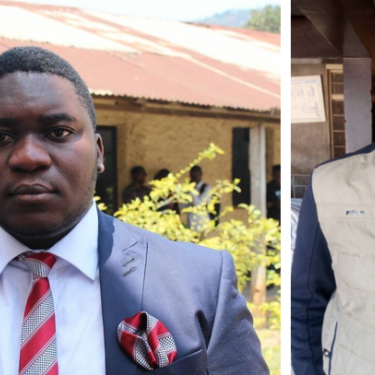Two Congolese journalists go into hiding after releasing documentary

Reporters Without Borders (RSF) holds the authorities responsible for the safety of two journalists who had to flee their homes in Bukavu, the capital of the province of Sud-Kivu in the east of the Democratic Republic of Congo, after making a documentary about hundreds of villagers evicted from land in a nearby locality known as Mbobero that is claimed by President Joseph Kabila.
Director Gaël Mpoyo and editor Franck Zongwe Lukawa fled Bukavu on 7 July, a day after their 27-minute documentary, entitled “Mbobero: might is always right,” was screened for the first time in the city. They did not attend the screening because they already felt threatened.
“Several strangers came to my home and asked my family where I was,” Mpoyo said. On 11 July, he received an anonymous SMS telling him to stop targeting President Kabila and to remove the documentary from YouTube, where it had been posted two days before. “We know where you are hiding and we are following all of your movements closely,” the message said.
Commissioned by a local NGO that is called New Civil Society Dynamic in DRC (NDSCI), the documentary includes interviews with villagers who were chased from their homes and with lawyers critical of the evictions. According to the film, more than 2,500 people have been evicted since 2016, 317 homes have been destroyed and a hospital has been demolished.
In a statement, the NDSCI said it was “dismayed by the wave of threats and other forms of intimidation” against several of its members, interviewees and the filmmakers. According to the information obtained by RSF, as well as the two journalists, at least three other participants in the documentary have left their homes as a safety precaution.
“We hold the Congolese authorities responsible for the fate of these journalists and their sources,” said Arnaud Froger, the head of RSF’s Africa desk. “The authorities have a duty to protect them and to allow them to work in an environment free of fear of reprisals.
“The threats following this documentary’s release are indicative of a climate that is very oppressive and threatening for journalists in the DRC and of the difficulties in tackling subjects that reflect poorly on the government in the run-up to a presidential election that has been awaited for the past two years.”
RSF has alerted the governor of Sud-Kivu province to the situation but he has not responded to SMSs. The National Union of the Congolese Press (UNPC) has also called on the local authorities to “do everything possible to protect Gaël Mpoyo and his entire family.”
Journalist in Danger (JED), RSF’s partner organization in DRC, said in a press release that it regarded the threats as “extremely serious” given the “generalized climate of violence” in Sud-Kivu, where “several journalists have been the victims of still unsolved murders.”
The presidential election that should have been held in late 2016, at the end of President Kabila’s term of office, is now due to take place on 23 December. With six months to go to the election, RSF and JED urged the authorities in June to postpone implementation of a new ministerial decree requiring all news websites to be registered.
RSF and JED also called last month for the reopening of four opposition radio and TV stations that have been closed for years. Under the so-called “New Year’s Eve Accord” between the government and opposition in December 2016, they are supposed to reopen before the presidential election is held.
The DRC is ranked 154th out of 180 countries in RSF's 2018 World Press Freedom Index.



